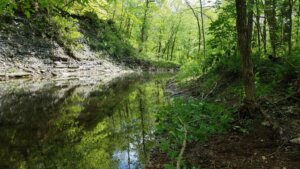As we shared last week, the US Forest Service (USFS) has issued its Final Supplemental Environmental Assessment (FSEA) for the Houston South Vegetation “Management and Restoration” Project. This assessment was accompanied by a Final Decision Notice and a Draft Finding of No Significant Impacts.
If allowed to continue, the Houston South Project will log 4375 acres and repeatedly burn 13,500 acres of the Hoosier National Forest (HNF) on steep hillsides with highly erodible soils in Jackson and Lawrence Counties, making it the largest logging and burning project in Hoosier National Forest history and one that still threatens the sole drinking water supply of 140,000 people.



(The fragile sides and different moods of the Starnes Branch, a creek that flows though the western half of Houston South. Much of the logging and burning will occur in 100-220 year old forest stands here. Photos by IFA staff.)
IFA is working diligently to protect this 13,500 acres in the HNF which occupies nearly one fourth of the largest block of wild forest in the states of Indiana, Ohio and Illinois and lies in the heart of the lands that S. 2990 is trying to protect. Accordingly, the best solution to stop this devastating “forest management” project is to pass S. 2990, the Benjamin Harrison National Recreation Area and Wilderness Establishment Act of 2023, introduced by US Senator Mike Braun last fall.
If passed, this landmark legislation would add 15,300 acres to the Charles C. Deam Wilderness, more than doubling its size and create the Benjamin Harrison National Recreation Area (NRA) on an additional 29,382 acres swallowing the entire Houston South Project. The legislation would prohibit Houston South’s logging and burning on 2,600 acres in the expanded wilderness area and greatly curtail it within the remaining 10,900 acres of the project in the NRA to protect Lake Monroe and the recreational and scenic value of the land. By protecting thousands of acres of mature hardwood forest, much of which is old enough to be considered old growth forest (greater than 150 years of age), S.2990 will sequester large quantities of carbon an essential tool to combat the Climate Crisis. S.2990 will achieve the Biden Administrations objective of preserving mature and old growth forest to combat climate change and conserve biodiversity in an amendment to all national forest plans while the Houston Project will completely contradict that amendment.
US Representative Erin Houchin previously indicated her willingness to introduce S.2990 in the House, but has since paused on taking this step without explanation. Please write to Rep. Houchin and urge her to introduce S 2990 in the House before it is too late.
The fate of S 2990, trees and wildlife in the Houston South project area and drinking water in Lake Monroe rests in Rep. Houchin’s hands. If you live in Representative Houchin’s District, please click here to write to Rep. Houchin today.
If you do not live in her district, please email Rep. Houchin’s Legislative Director, Jonathan Van Buren at: jvb@mail.house.gov or send the Rep. Houchin an old-fashioned letter to:
Congresswoman Erin Houchin
1632 Longworth House Office Building
Washington, DC 20515
For more information, contact:
Jeff Stant, Executive Director: jeff@indianaforestalliance.org
Steven Stewart, Hoosier National Forest Program Director: stevenstewart@indianaforestalliance.org


(There are many animals that will die painfully from the unnatural prescribed burning proposed for the entire project area at Houston South. These box turtles were burned to death by a prescribed fire last year at Ferdinand State Forests The garter snake was a victim of a prescribed fire at a Michigan Conservation area. Turtle photos by Rock Emmert, Friends of The Ferdinand State Forest. Snake photo by Joanna Gibson)




(By burning throughout the year including in the spring and summer and logging in known roosting habitat for these bats, the Houston South project will kill pups and mothers of these bats who are unable or unwilling to escape prescribe fire or the felling of their roost trees. Indiana and northern long-eared are federally endangered, tricolored is proposed for this protected status and little brown is under study for the endangered status. IFA surveys caught Indiana and tricolored bats and found their roosts in the Houston South area and detected Northern long-eared and little brown bats acoustically in the area last year. Photos from ESI.)





(The black and white, hooded and worm-eating warblers are rare state
species of special concern in Indiana that are common in the Houston South area. They nest on
the ground or in shrubs close the ground. Their young, such as the worm-eating warbler
nestlings in the nest pictured here, will be burned alive by prescribed burning in the spring or
early summer. The female state endangered cerulean warbler (last photo on the lower right) is
feeding it’s young a nest high in a white oak that may be felled by logging. An IFA survey found
23 nesting territories of cerulean warblers per square mile in parts of the Houston South area
along creeks. Ceruleans need large, undisturbed older hardwood forests and have not been
found to nest successfully in Indiana outside of the Highland Rim Natural Region that
encompasses the Houston South area. Photos from IFA surveys of Houston South led by David
Rupp. Black and white warbler photo by Nancy Lightfoot. Hooded warbler photo by Nina Hale.
Worm-eating warbler photo by Scott Evans.)




(The Southern black racer and rough green snake (a state species of special concern) are residents of Houston South which also harbors much of the only range in Indiana for the state endangered timber rattlesnake. Two of them are pictured here on a sugar maple log in the proposed wilderness addition. These snakes as well as salamanders such as the Jeffersons salamander pictured here, will be likely victims of prescribed fire at Houston South. Black racer photo by David Rupp. Rough green snake photo by Heather Milbrath. Other photos by IFA staff.)

